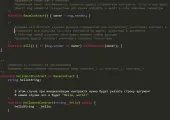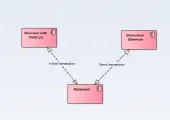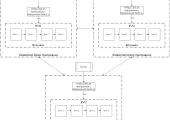Provided services
Product Development, Frontend Development, Manual Testing Services, Early-Stage Innovation, R&D Services
Client
Organization for public health monitoring, disease prevention, and control.
Product
Decentralized document management platform for medical organizations that specializes in professional medical examinations of employees of various companies. This platform is based on blockchain technology and allows the implementation of a reliable and secure storage of information about the personal files of employees.
The system provides for the roles of medical specialists conducting the examination (therapist, neurologist, surgeon, dermatologist, psychiatrist, etc.) and a senior medical officer. The senior medical officer has the right to add new medical specialists and employees, as well as to make a final decision if the employee has had a full medical check. A medical specialist can make a diagnosis only within the framework of his/her specialization and cannot change it after making a diagnosis.

Challenge
The client wanted our team to work in rapid iterations so that changes within research would be implemented quickly. It was necessary to do proof of concept on a regular basis. With this approach, the customer could make sure that the changes being made were actually helping to solve the core problems.
So the main challenge was not to lose focus on the core, to focus on the customer’s main pain points, not to get confused, to do research and apply it to the product right away.
Solution
Our team quickly dived into the subject area and technical details of the project in a very short time. Following our best practices during the immersion we developed architecture and component diagrams, drew schematics, tracked the process of changes made, and recorded each of them. Therefore, the process was as transparent as possible for the customer.
The diagrams and schematics formed the basis of the project documentation, which was also specifically designed to support the product after the main development phase.
The development was carried out using Scrum, including all the basic attributes and rituals.
Technological Overview
The use of blockchain excludes the possibility of data spoofing and hacking attacks since it uses special methods of data encryption. The problem of mediation and verification of documents is solved with the help of smart contracts (a computer algorithm designed to form, control, and provide information about the ownership of something), since a contract program with a built-in algorithm for signing documents and confirming the authorship of material acts as a registrar, compiler and intermediary certifying the authenticity of records. So, blockchain technology allows to reliably preserve the historicity of information, as well as save on intermediaries in the process of document flow.
The specific nature of the blockchain technology allows the application not to depend on a separate server since each network participant has the program code and data. So, the independence of the network in direct proportion depends on the number of participants in the blockchain network. High reliability is due to the power of the network. To hack it, an intruder needs much higher computing power than the entire blockchain network has, and this is extremely unlikely. For example, the Ethereum core network has a capacity of about 500 supercomputers.
The platform is based on the client and server parts. The server is based on Ethereum – a specific implementation of blockchain and smart contracts. The smart contracts of the medical organizations are developed in the Solidity language. The client-side works with the Angular framework and the Metamask browser extension, which links Angular and the smart contract. The project also uses Smart Contract, Truffle, web3.js, and IPFS.
This solution has significant differences and advantages compared to similar classical centralized implementations. The medical organization system developed based on smart contracts is fully decentralized, transparent, and protected from changes by intruders.
Result
Through agile approaches, in short iterations, our team developed an architecture for a fully decentralized application based on blockchain technology. We focused only on the most important tasks without getting confused and successfully designed a non-trivial front-end project architecture for a specific domain area.
The project was documented. The technologies and methods used to design decentralized applications were described.
This system is currently being implemented in other customers.
JazzTeam Achievement
Through consistent work on the project, our company expanded its expertise in cryptography, blockchain technology, smart contracts, and decentralized application development.
Screenshots
Technologies
Stack: Smart Contract, Truffle, Solidity, Angular, TypeScript, web3.js.
Infrastructure: Git/Gerrit, Remix IDE, Geth.
Tools: Metamask Extension for Firefox.
Storage: IPFS.
Blockchain: Ethereum.












